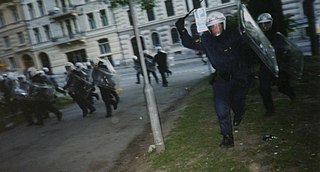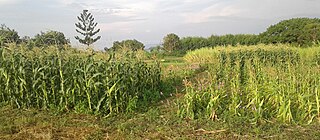
The wild boar, also known as the wild swine, common wild pig, Eurasian wild pig, or simply wild pig, is a suid native to much of Eurasia and North Africa, and has been introduced to the Americas and Oceania. The species is now one of the widest-ranging mammals in the world, as well as the most widespread suiform. It has been assessed as least concern on the IUCN Red List due to its wide range, high numbers, and adaptability to a diversity of habitats. It has become an invasive species in part of its introduced range. Wild boars probably originated in Southeast Asia during the Early Pleistocene and outcompeted other suid species as they spread throughout the Old World.

The dingo is an ancient (basal) lineage of dog found in Australia. Its taxonomic classification is debated as indicated by the variety of scientific names presently applied in different publications. It is variously considered a form of domestic dog not warranting recognition as a subspecies, a subspecies of dog or wolf, or a full species in its own right.
Push–pull is a configuration for locomotive-hauled trains, allowing them to be driven from either end of the train, whether having a locomotive at each end or not.

A baton charge is a coordinated tactic for dispersing crowds of people, usually used by police, paramilitary or military in response to public disorder. In the Indian subcontinent, a long bamboo stick, called lathi in Hindi and Urdu, is used for crowd control, and the expression lathi charge commonly employed to describe the action.

The GWR Autocoach is a type of coach that was used by the Great Western Railway for push-pull trains powered by a steam locomotive. The distinguishing design feature of an autocoach is the driving cab at one end, allowing the driver to control the train without needing to be located in the cab of the steam locomotive. This eliminates the need to run the engine round to the other end of the coach at the end of each journey.

Push–pull technology is an intercropping strategy for controlling agricultural pests by using repellent "push" plants and trap "pull" plants. For example, cereal crops like maize or sorghum are often infested by stem borers. Grasses planted around the perimeter of the crop attract and trap the pests, whereas other plants, like Desmodium, planted between the rows of maize, repel the pests and control the parasitic plant Striga. Push–pull technology was developed at the International Centre of Insect Physiology and Ecology (ICIPE) in Kenya in collaboration with Rothamsted Research, UK. and national partners. This technology has been taught to smallholder farmers through collaborations with universities, NGOs and national research organizations.
A monk's spade, also called a Shaolin Spade, is a Chinese pole weapon consisting of a long pole with a flat spade-like blade on one end and a smaller crescent shaped blade on the other. Neither blade was designed to be sharpened. In old China, Buddhist monks often carried spades (shovels) with them when travelling. This served two purposes: if they came upon a corpse on the road, they could properly bury it with Buddhist rites, and the large implement could serve as a weapon for defence against bandits. The crescent was designed as defense against small to medium-sized predators such as wild dogs and leopards. The way it is used is to hold the animal at bay by positioning the crescent at the animal's neck and pushing it away if needed. Over time, they were stylised into the monk's spade weapon.

A control car, cab car, control trailer, or driving trailer is a non-powered rail vehicle from which a train can be operated. As dedicated vehicles or regular passenger cars, they have one or two driver compartments with all the controls and gauges required to remotely operate the locomotive, including exterior locomotive equipment such as horns, bells, ploughs, and lights. They also have communications and safety systems such as GSM-R or European Train Control System (ETCS). Control cars enable push-pull operation when located on the end of a train opposite its locomotive by allowing the train to reverse direction at a terminus without moving the locomotive or turning the train around.

Mattias Lindblom is a Swedish singer, writer, composer and music producer. He has contributed productions, music and lyrics for artists such as Tina Arena, Andy Taylor, Tarja Turunen and Garou, as well as for musical, brands, TV and film. He is the lead singer of electronica band Vacuum. Mattias Lindblom is based in Melbourne, Australia.

A pistol is a type of handgun, characterized by a barrel with an integral chamber. The word "pistol" is derived from the Middle French pistolet, meaning a small gun or knife, and first appeared in the English language c. 1570 when early handguns were produced in Europe. In colloquial usage, the word "pistol" is often used as a generic term to describe any type of handgun, inclusive of revolvers and the pocket-sized derringers.

Feuchy is a commune in the Pas-de-Calais department in the Hauts-de-France region of France. It is a small village, with a little more than 1000 inhabitants, and had only about 500 inhabitants in 1914. It is situated two kilometers east of Arras. During World War I, in 1914, it was occupied by German troops. British troops took over the Arras sector in March 1916. On April 9, 1917, the British operation "big push" led to advancement of several miles to the east in a battle with one with the most casualties per day, and Feuchy was liberated. The German offensives placed Feuchy under their control in 1918 until the Canadians cleared the area in August 1918. The population of Feuchy was evacuated and the village was completely destroyed.
Shelley Meals is an American television writer and producer. She is currently an Executive Producer on Welcome to Derry and Shadow and Bone . She has also worked on See, Sweet Magnolias, Chicago Med, Stitchers, Witches of East End, King & Maxwell,Rizzoli & Isles, Wild Card, Strong Medicine, Time of Your Life, Push, Dawson's Creek, Fame L.A., Dangerous Minds, and New York Undercover.

Wild Well Control is a well control company based in Houston, Texas that has worked to mitigate several high-profile well control issues including the Kuwaiti oil fires and the Deepwater Horizon oil spill.
Darin Goldberg is an American television writer and producer. He has worked on Wild Card, Strong Medicine, Time of Your Life, Push, Dawson's Creek, Fame L.A., Dangerous Minds, The Young and the Restless and New York Undercover.
Ops (B) was an Allied military deception planning department, based in the United Kingdom, during the Second World War. It was set up under Colonel Jervis-Read in April 1943 as a department of Chief of Staff to the Supreme Allied Commander (COSSAC), an operational planning department with a focus on western Europe. That year, Allied high command had decided that the main Allied thrust would be in southern Europe, and Ops (B) was tasked with tying down German forces on the west coast in general, and drawing out the Luftwaffe in particular.

The Wild Blue Yonder is a 1951 war film directed by Allan Dwan. The film stars Wendell Corey, Vera Ralston, Forrest Tucker and Phil Harris. Wild Blue Yonder deals with the Boeing B-29 Superfortress air raids on Japan during World War II.
Cannabis in Bhutan is illegal, but grows prolifically in the country and has multiple traditional uses, such as feeding pigs and producing textiles.
The 1942 Ole Miss Rebels football team was an American football team that represented the University of Mississippi as a member of the Southeastern Conference (SEC) during the 1942 college football season. In their fifrth year under head coach Harry Mehre, the Rebels complied an overall record of 2–7, with a conference record of 0–5, and finished 12th in the SEC.
Cannabis in Kazakhstan is illegal.

Push feed and controlled feed are two main types of mechanisms used in firearms to describe how the bolt drives the cartridge into the chamber and extracts the spent casing after firing.












